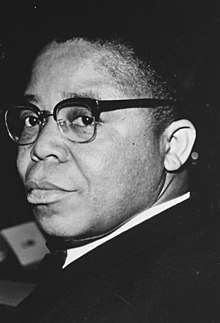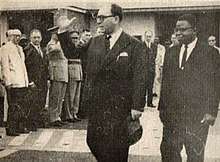Joseph Kasa-Vubu
| Joseph Kasa-Vubu | |
|---|---|
 Joseph Kasa-Vubu at the Belgo-Congolese Round Table Conference, January 1960 | |
| 1st President of the Republic of the Congo | |
|
In office 27 June 1960 – 24 November 1965 | |
| Prime Minister |
Patrice Lumumba Joseph Iléo Justin Marie Bomboko Joseph Iléo Cyrille Adoula Moise Tshombe Évariste Kimba |
| Preceded by | Position established |
| Succeeded by | Mobutu Sese Seko |
| Personal details | |
| Born |
c. 1915 Kuma-Dizi, Mayombe, Belgian Congo |
| Died |
24 March 1969 (aged approx. 53-54) Boma, Democratic Republic of the Congo |
| Political party | ABAKO |
| Children | Justine Kasa-Vubu |
Joseph Kasa-Vubu, alternatively Joseph Kasavubu, (c. 1915 – 24 March 1969) was the first President of the Republic of the Congo (1960–65), today the Democratic Republic of the Congo.
Early life
Joseph Kasa-Vubu was born in the village of Kuma-Dizi in the Mayombe district of the Belgian Congo. Different sources list his year of birth as 1910, 1913, 1915, or 1917, though 1915 is the most probable date. He was the eighth of nine children in a family of the Yomba ethnic group, a subset of the Kongo people. His father was a successful farmer who, as an independent entrepreneur, traded with street merchants in Cabinda and built his house at the outskirts of the village. This earned him the animosity of the villagers and in an attempt to assuage their hostility he volunteered to undergo a "poison test" with a substance extracted from a kasa tree.[lower-alpha 1] The word "Kasa" was appended onto his name in commemoration of the event.[3] Kasa-Vubu's mother died four years after his birth, and his father died in 1936. On 31 January 1925 he was baptised under the Christian name of Joseph at the Scheutist Catholic mission of Kizu, near Tshela.[4]
In 1927 Kasa-Vubu enrolled in primary school at the third-year level. The following year he transferred to a minor seminary in Mbata-Kiela, 50 kilometers away from Tshela. There he completed his primary studies and began learning Latin and humanities in preparation for instruction at major seminary. An industrious student, Kasa-Vubu graduated second in his class in 1936 and was admitted to the Kabwe seminary in Kasai Province. He intended to study three years of philosophy and five years of theology before becoming an ordained priest. But following the completion of the former courses in 1939 he was expelled by the bishop.[4][lower-alpha 2]
Kasa-Vubu subsequently returned to Mayombe and took up work as a bookkeeper for the Kangu mission. Disatisfied with his salary of 80 francs per month, Kasa-Vubu passed the instructor's exam and became a sixth grade teacher at the mission school in early 1941. However his pay was not increased and he left the mission in open disagreement with the superior and the local bishop. In May he found a new job at Agrifor, an agricultural and logging company. With a monthly pay of 500 francs, he felt financial secure enough to marry; on 10 October Kasa-Vubu wedded Hortense Ngoma Masunda in a Catholic ceremony at the Kangu mission. They had nine children.[4]
In June 1942 Kasa-Vubu earned a job as a clerk in the finance department of the Belgian colonial administration in Léopoldville, the capital of the Congo. He worked there for 15 years,[4] attaining the rank of chief clerk, the highest level of employment available to Congolese civil servants under Belgian rule.[5] In 1956 he was in charge of accounting for all of the administration's general stores.[6]
Political activities
Kasa-Vubu began semi-clandestine political organizing work while he was still employed by colonial authorities.[7]
In 1955 Kasa-Vubu was elected leader of the ABAKO (Alliance des Bakongo), made primarily of his own people, from around the Congo River. Under his leadership, the group swept the first open municipal Leopoldville elections in 1957 and he was elected mayor of the Dendale district of the city.[5]
Kasa-Vubu quickly became known as one of the first Congolese leaders to call for independence. At first, he advocated for independence from Belgium on a 30-year timeline, but he shortened the timetable as the ABAKO movement gained in strength.[7] In his inauguration speech as mayor of Dendale, Kasa-Vubu reiterated his demand for independence, drawing a reprimand from Belgian colonial authorities, which only strengthened his image as a Congolese leader.[5]
On 4 January 1959, an ABAKO political gathering organized by Kasa-Vubu erupted into violence, sparking the Léopoldville riots, a pivotal moment in the Congolese struggle for independence. Kasa-Vubu was set to address the crowd on African nationalism, but colonial authorities banned the meeting. They were unable to calm the crowd and thousands of Congolese began rioting. Kasa-Vubu was arrested, along with several other leaders, and imprisoned for inciting the riot. He was released two months later.[5]
Congolese independence

Upon Congo's independence from Belgium, the ABAKO won a significant number of votes in the new parliament but not an outright victory. In a political compromise, it was agreed that Patrice Lumumba, of the Mouvement National Congolais (MNC) would be prime minister, and Kasa-Vubu would face Jean Bolikango, a former mentor in the ABAKO, for the presidency.[8] The election of Kasa-Vubu brought about wide-ranging acceptance of the Congo's new administration. The Belgian press reacted positively to the development, while the Léopoldville's daily newspaper Courrier d'Afrique, edited by a Kongo, showed much warmer approval of the government. International opinion expressed satisfaction at the striking of a proper balance in leadership.[9] Belgian politicians hoped that Kasa-Vubu would check Lumumba's impulses and personal disdain for Belgium.[10] He was officially sworn in as President on 27 June.[11]
The new republic was immediately disrupted by political and military strife and regional secessionist movements, and the central government was paralyzed by conflict between the more conservative Kasa-Vubu and leftist Prime Minister Lumumba. While Lumumba advocated for a stronger central government, Kasa-Vubu preferred a more decentralized form of government that gave autonomous powers to provinces under a federal system.[7]
Kasa-Vubu was regarded as rather mysterious in his motivations and his actions, frequently preferring to stay silent or give ambiguous answers when he was confronted. His role as head-of-state was theoretically ceremonial and far less influential than Lumumba's role as prime minister. During the immediate upheaval following independence, Kasa-Vubu took few steps and made few definitive statements, even as Lumumba appealed for international assistance to the Americans, the United Nations and the Soviet Union.[7]
Congo Crisis

On 5 September, Kasa-Vubu dismissed Lumumba, who was accused of communism. Lumumba refused to accept that but announced Kasa-Vubu's dismissal,[12] creating a stalemate that endured until 14 September, when Army Commander Joseph-Désiré Mobutu seized power and arrested Lumumba. Lumumba was later handed to Moise Tshombe's secessionist forces in the southern province of Katanga and killed.
Over the next five years, Kasa-Vubu presided over a succession of weak governments. In July 1964, he appointed Tshombe as prime minister, with a mandate to end the Simba Rebellion. Tshombe recalled the exiled Katangese gendarmerie and recruited white mercenaries, integrating them with the Armée Nationale Congolaise (ANC). Many of the mercenaries had fought for Katanga while Tshombe was leader of that breakaway province. Despite the successes against the Simba rebels, Tshombe's prestige was damaged by his use of white mercenaries and western forces. He lost the support of Kasa-Vubu, who dismissed him from the post of prime minister, in October 1965.
Mobutu seized power for a second time on 25 November 1965, now deposing Kasa-Vubu and subsequently declaring himself head of state.
Death
Mobutu placed Kasa-Vubu under house arrest[13] before eventually allowing the deposed president to retire to his farm in Mayombe. Kasa-Vubu died in a hospital in Boma four years later in 1969, possibly after a long illness.[5]
Legacy
Following his death, Kasa-Vubu's family went into exile, first to Algeria and then Switzerland.[8] One of his daughters, Justine M'Poyo Kasa-Vubu, eventually returned to the Congo (then called Zaire) in the 1990s. In 1997, she was appointed a cabinet minister by Laurent Kabila and then ambassador to Belgium.[14]
Kasa-Vubu's role in Congolese history has been overshadowed in literature by Lumumba and Mobutu.[15]
Honours
- Grand Cordon in the Order of Leopold.[16]
In popular culture
- In the 2000 film Lumumba, Kasa-Vubu was played by Maka Kotto.
Notes
- ↑ The poison from a kasa tree was used to determine whether or not a person was a witch.[1] According to biographer Charles-André Gilis, the test occurred on the day of Kasa-Vubu's birth.[2]
- ↑ No official reasoning was ever given for Kasa-Vubu's expulsion, though Gilis and Kasa-Vubu's daughter, Justine, attribute this to his alleged commitment to an academic pursuit of justice that ran afoul of his teachers' ideals.[4]
References
- ↑ Morris 2006, p. 157.
- ↑ Biographie belge d'outre-mer 2015, p. 218.
- ↑ Biographie belge d'outre-mer 2015, pp. 217–218.
- 1 2 3 4 5 Biographie belge d'outre-mer 2015, p. 219.
- 1 2 3 4 5 Reuters 1969.
- ↑ Biographie belge d'outre-mer 2015, p. 220.
- 1 2 3 4 Tanner 1961.
- 1 2 Kisangani 2009, p. 265.
- ↑ Hoskyns 1965, p. 79.
- ↑ Hoskyns 1965, p. 83.
- ↑ Bonyeka 1992, pp. 248–249.
- ↑ Doyle 2006, p. 175.
- ↑ Rich 2012, p. 304.
- ↑ Kisangani 2009.
- ↑ Loffman, Reuben (22 June 2017). "From Mobutu to Kabila, the DRC is paying a heavy price for autocrats at its helm". The Conversation. Retrieved 18 January 2018.
- ↑ http://www.lavdc.net/portail/les-discours-du-30-juin-1960-roi-baudouin-pdt-joseph-kasavubu-et-le-1er-min-patrice-emery-lumumba/
Sources
- Bonyeka, Bomandeke (1992). Le Parlement congolais sous le régime de la Loi fondamentale (in French). Kinshasa: Presses universitaire du Zaire. OCLC 716913628.
- Doyle, Michael W.; Sambanis, Nicholas (2006). "Chapter 4: Making War". Making War and Building Peace: United Nations Peace Operations. Princeton, New Jersey: Princeton University Press. pp. 144–196. ISBN 978-0-691-12275-5.
- LaFontaine, J.S. (1986). City Politics: A Study of Léopoldville 1962–63. American Studies. Cambridge University Press Archive.
- Hoskyns, Catherine (1965). The Congo Since Independence: January 1960 – December 1961. London: Oxford University Press. OCLC 414961.
- "Joseph Kasavubu Dies in Congo; Was His Nation's First President" (PDF). Reuters. 24 March 1969. Retrieved 19 August 2014.
- "Kasa-Vubu (Joseph)" (PDF), Biographie belge d'outre-mer (in French), IX, Brussels: Académie Royale des Sciences d'Outre-Me, 2015, OCLC 561667718
- Kisangani, Emizet Francois; Bobb, Scott F. (2010). Historical Dictionary of the Democratic Republic of the Congo (3rd ed.). Plymouth, UK: Scarecrow Press. ISBN 978-0-8108-5761-2. Retrieved 19 August 2014.
- Morris, Brian (2006). Religion and Anthropology: A Critical Introduction. Cambridge University Press. ISBN 9780521852418.
- Rich, Jeremy (2012). "Kasa-Vubu, Joseph (1915–1969)". In Akyeampong, Emmanuel Kwaku; Gates, Henry Louis. Dictionary of African Biography. 3. Oxford, England: Oxford University Press. pp. 302–304. ISBN 978-0-19-538207-5.
- Tanner, Henry. "The Patient African – Kasavubu" (PDF) (26 February 1961). New York Times. Retrieved 19 August 2014.
Further reading
- Kasa-Vubu, Justine M'Poyo (1997). Kasa-Vubu et le Congo indépendant: 1960–1969. Brussels: Le Cri édition. ISBN 9782871061854.
- Kasa-Vubu, Justine M'Poyo (1985). Joseph Kasa-Vubu, mon père: de la naissance d'une conscience nationale à l'indépendance. Brussels: Éditions de Chabassol. OCLC 17233037.
| Preceded by Position created on independence from Belgium |
President of the Republic of the Congo 1960–1965 |
Succeeded by Mobutu Sese Seko |